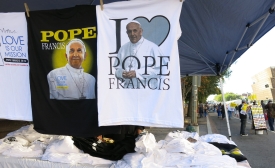pope francis
Pope Francis has a similar ambition to shape history. He wants to steer it away from what he’s called the “globalization of indifference” to the poor, refugees, and other victims of a “throw-away culture”, and he wants to end a Third World War he believes is being fought today in “piece-meal” fashion.
Nairobi — Pope Francis Thursday morning held an inter-faith dialogue with religious leaders where he advocated for peaceful co-existence among Kenyans and good governance to reduce radicalization among the youth.
Muslim leaders the world over are condemning the horrific terror attacks that struck Paris Friday night, expressing outrage and shock at an onslaught of shootings and bombings that left at least 120 dead and hundreds wounded. Muslim imams, scholars, commentators, and average Muslims expressed grief and horror using social media.
Pope Francis called Monday for a fresh start for Roma and Sinti communities, telling traveller families from around the world they could break free of prejudice by not falling into crime.

Experts weigh in on the Pope's soft power potential.
True, neither the pope, let alone Argentina, have the political, military or financial power to enforce the UNGA-approved principles. But they can exercise their “soft power,” which is the ability of a country — or, in this case, the Vatican — to persuade others to do what it wants without force or coercion, be it (again, in this case) financial or political. In fact, soft power, a given for important states, is a must for those nations lacking such attributes.
Francis’ visit to the U.N. caps a series of recent diplomatic interventions, including serving as a mediator and guarantor during 18 months of secret negotiations between the United States and Cuba. The two countries resumed diplomatic relations in July, restoring official ties that were cut in 1961.
In his first major address during a 10-day trip combining visits to the long-isolated but neighboring nations of Cuba and the United States, Pope Francis on Sunday gave a wide-ranging treatise on the Christian call to be at service to one another. [...] [T]he pope continued: "Service is never ideological, for we do not serve ideas, we serve people."







